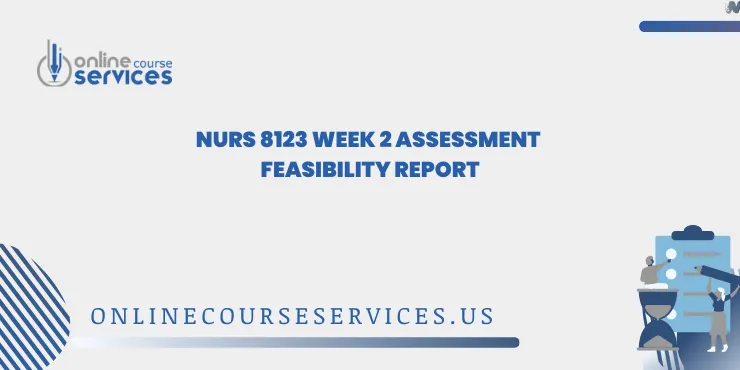- NURS 8123 Week 2 Assessment Feasibility Report.
Feasibility Report
Practice Partner Name
Community College Nursing Program
Project Site
The project will be implemented in the nursing education curriculum of the community college.
Project Setting
The proposed project, as outlined in the NURS 8123 Week 2 Assessment Feasibility Report, is within a Community College Nursing Program intending to increase student retention rates. It deals with the provision of Mentorship Programs and Academic Support Services. These interventions aim at helping students navigate through the program, clarifying their academic needs, and guaranteeing that the students remain in the program.
Needs Assessment
The needs assessment of the Community College Nursing Program shows a couple of factors that have prompted the low retention rates. The problems include barriers to academic achievements, the absence of a suitable role model, and limited resources. The students’ overview shows that students require a clear roadmap and tools to help them manage their academic work. Also, the program’s retention information shows significant points of dropout related to these issues that the students face.
- Mentorship Programs and Support
In such a way, Mentorship Programs are suggested to provide a specialized and career-related support system. Academic support services will include tutoring, study materials, and workshops, which will help enhance the students’ academic abilities (Hoyt, 2021). Such interventions are intended to develop a supportive environment that would meet the described needs and, therefore, increase the retention of the students in the nursing program.
Problem Identified
The main issue was the high student dropout rate in the Community College Nursing Program, which academic difficulties can explain, the lack of a tutor, and the limited availability of educational support services.
Scope of Problem
Of most concern in the retention issue within the Community College Nursing Program are the consequences of how students progress and program results. Low retention rates affect the program’s competency to realize qualified graduates, thus affecting the readiness of the workforce and the quality of healthcare services Chan et al., 2019. It solves the problem not only for students’ success or recognition of the program as such, but rather to meet the needs in society for the healthcare workforce.
Outcome Population
The proposed intervention will seek to address the target population of current and future students in the Community College Nursing Program. These are direct beneficiaries in whose interest these retention strategies will be implemented to better their educational journey and ease the pursuit of careers in nursing, thereby increasing their chances of being employable and competent in health care provision.
Stakeholders
The target groups include the students, faculty, administration, and healthcare employers. The groups are exceedingly important in the achievement of the program; students get enhanced support, the faculty oversees the academic progress, the administration is responsible for policies and resources, and healthcare employers depend on graduates’ performance. The involvement of these stakeholders guarantees cooperation in supporting the program and its objectives of increasing the retention of the program and producing competent nursing personnel.
Systems Thinking
Systems thinking implies analyzing the components and processes that affect the retention rate of the nursing program. It examines aspects such as the curriculum, the mentorship, the services provided to the students, and the institution’s policies for student achievement (Ayalon, 2023). Thus, applying systems thinking, the program can outline the areas of change, manage the resources efficiently, and develop a system that encourages students’ retention and helps them become competent professionals in the nursing field.
Project Outcome
The proposed project, NURS 8123 Week 2 Assessment Feasibility Report, will help increase the retention rate in the Community College Nursing Program through Mentorship Programs and Academic Support Services. By providing more extended support services and guiding mechanisms, the outcome will contribute to academic success, student satisfaction, and graduation rates, hence strengthening the program and the nursing workforce.
Project Impact
This project will probably have a ripple effect on retention in addition to engagement, academic performance, and career development. The designed programs will help establish a healthy learning environment conducive to addressing some of the root causes of all the above issues, thereby facilitating learning and preparation for health careers.
EBP Intervention
The proposed interventions for the Community College Nursing Program’s retention issues include Mentorship Programs and Academic Support Services. Nurture mentorship programs can provide nursing students with one-on-one guidance in their studying, make them feel that they belong, and help them grow in their roles as medical attendants (Jacobsen et al., 2022). Academic Support Services provide specific solutions to help improve students’ grades and self-efficacy (Eakman et al., 2019).
- Enhancing Student Retention and Development
The program, therefore, focuses on creating an enabling environment that sees higher student involvement, reduced dropout rates, and increased retention through the combined interventions. It prepares the students in their academic process and their personal and career development, building a much stronger and more stable workforce of medical caretakers.
Population
Nursing students who have enrolled in the Community College Nursing Program.
Problem Statement
Poor retention among nursing students within the Community College Nursing Program significantly affects academic advancement and professional development. The consequences of this low retention rate beckon appropriate interventions that can assure student success and a resilient nursing workforce.
PICOT
Among nursing students who enroll in the Community College Nursing Program, does implementing Mentorship Programs and Academic Support Services as an intervention, compared to those without an intervention, improve the retention rates toward the close of the academic year 2025?
– P (Population): Nursing students enrolled in the Community College Nursing Program.
– I (Intervention): Mentorship Programs and Academic Support Services are implemented.
– C (Comparison): No provision for Mentorship Programs and Academic Support Services.
– O (Outcome): Intervention improves retention rates.
– T (Time): Toward the finish of the academic year 2025.
Timeline
It will start at the beginning of the academic year in the Fall Semester of 2024 and can be adjusted as necessary, given student feedback and changing industry best practices.

